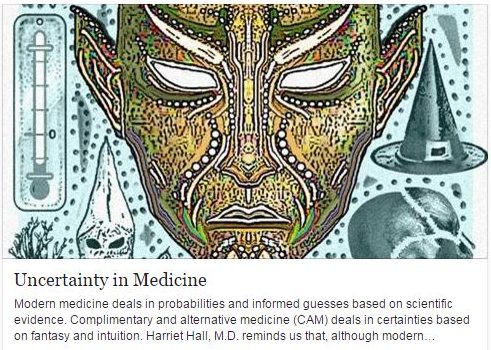 We’ve written often about uncertainty, which is a recurring challenge in medicine and especially in participatory medicine, where issues of relationship and decisions are core.
We’ve written often about uncertainty, which is a recurring challenge in medicine and especially in participatory medicine, where issues of relationship and decisions are core.
Some doctors have told me they were trained to display certainty even when things aren’t sure, and many patients (in my experience) want certainty about their diagnoses, or at least want their clinicians to act confidently.
But our board member Peggy Zuckerman also serves on the patient engagement committee of our “cousin” the Society to Improve Diagnosis in Medicine, and as she said on NBC last year, diagnosis ain’t always easy. And when things don’t work out well, patients can feel wronged and clinicians can be blamed.
I wonder, what if we could all accept uncertainty and cope with it together?
An article on uncertainty last month in The Skeptic discusses the reality. On Facebook our board member Peter Elias MD called it “a fine and pretty comprehensive review of how much uncertainty there is in medicine.” Here’s the first part, with some added returns for easier reading:
One of the reasons I went into medicine was the naïve idea that doctors always know what to do. I was wrong. Marya Zilberberg got it right when she said, “The only certain thing about medicine is uncertainty.” Patient histories are uncertain, physical exams are uncertain, tests are uncertain, diagnoses are uncertain, treatments are uncertain, even human anatomy is uncertain.
Doctors are not scientists; they are practical users of science who apply scientific evidence to patient care. Medicine deals in probabilities and informed guesses, not certainties.
Symptoms can mean many things. They can be a sign of serious illness requiring treatment, an illness we don’t yet know how to identify and treat, a benign condition that will resolve without treatment, a hyper-awareness of normal bodily functions, depression, somatization disorder, malingering, or a cry for help.
How can we cope with this? Any ideas? Patients and clinicians, what’s your experience with this?






I love this: “…what if we could all accept uncertainty and cope with it together?”
Doing so allows patients to hear brainstorming by clinicians, and allows clinicians to hear brainstorming by patients, without missing or minimizing clues each point of view might provide.
My very best medical professionals have often shown this refreshingly honest behavior and I found it to be very helpful, bolstering my trust in the process along with my goal: to find and use the best and latest information to achieve the best possbike medical results.